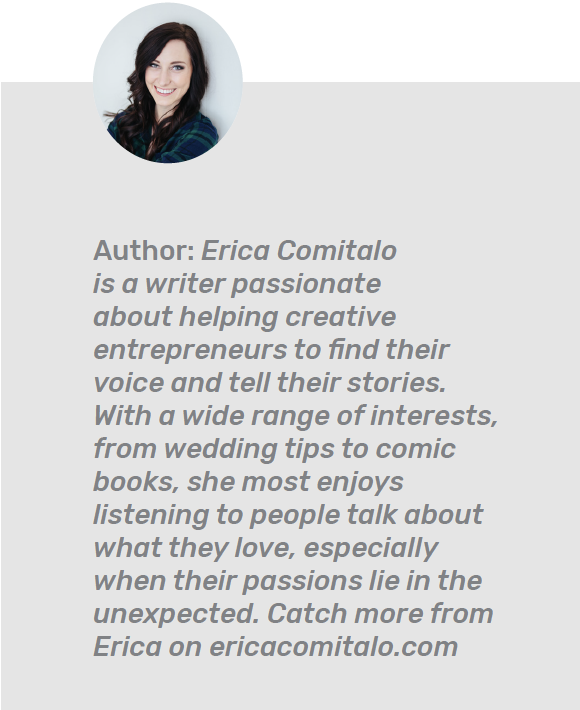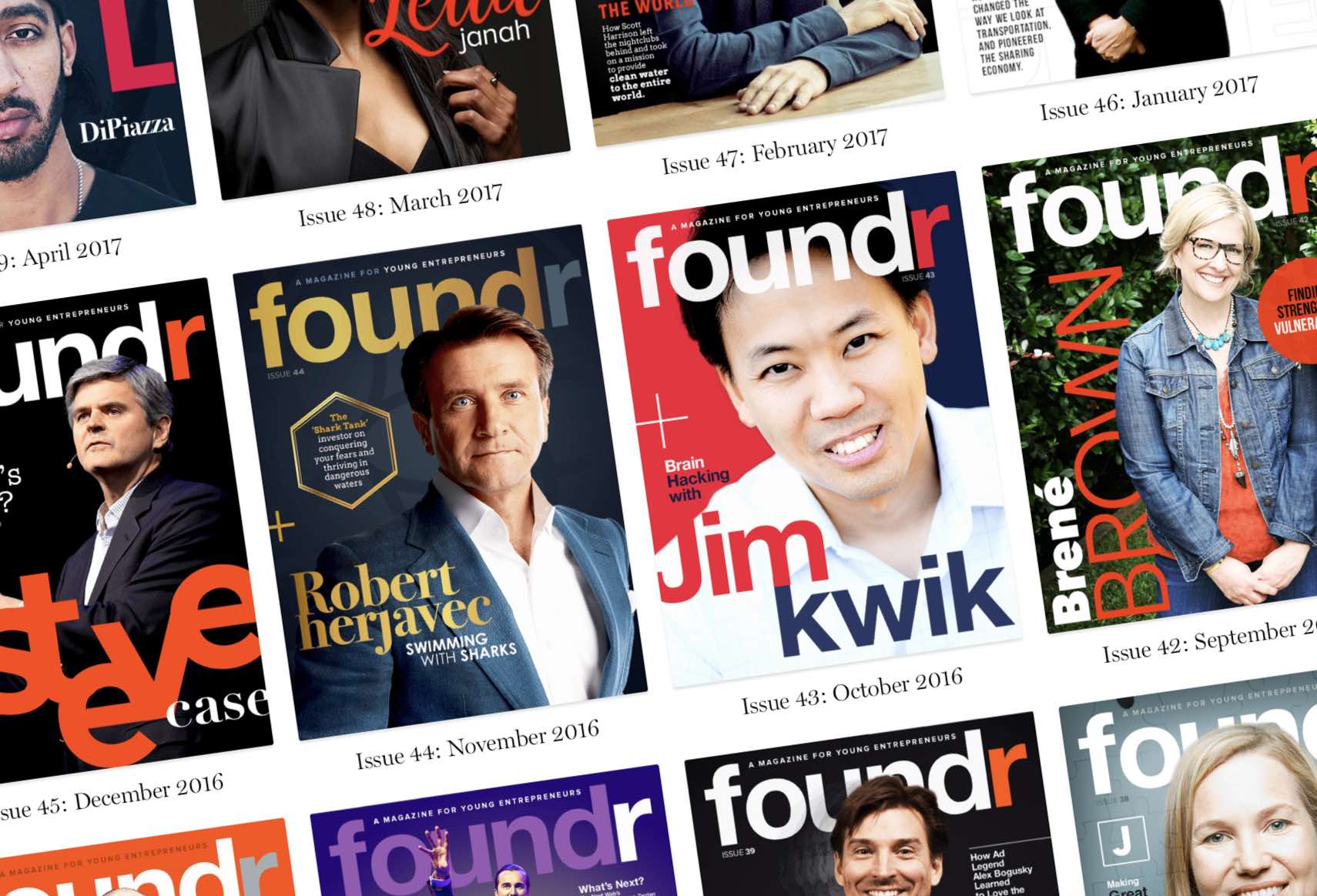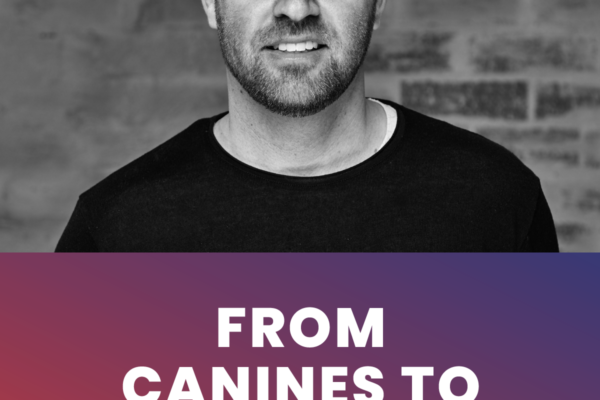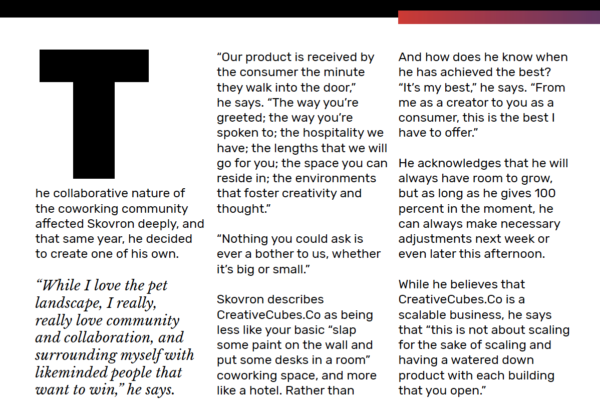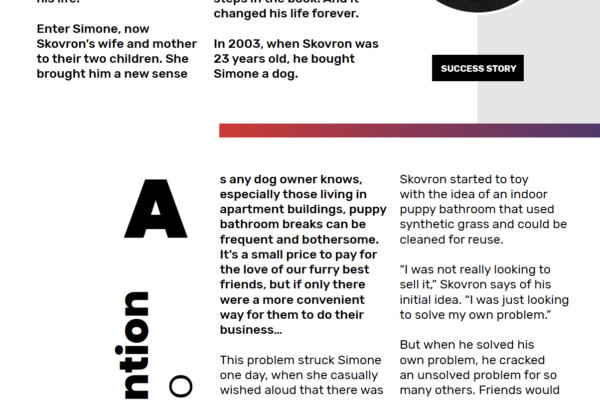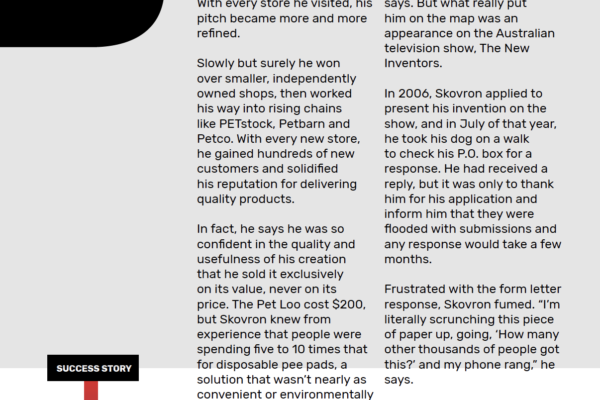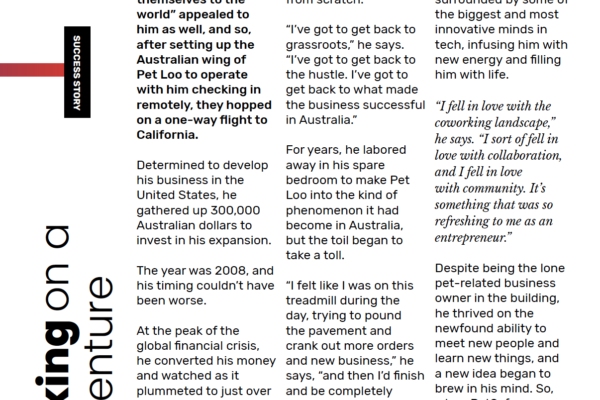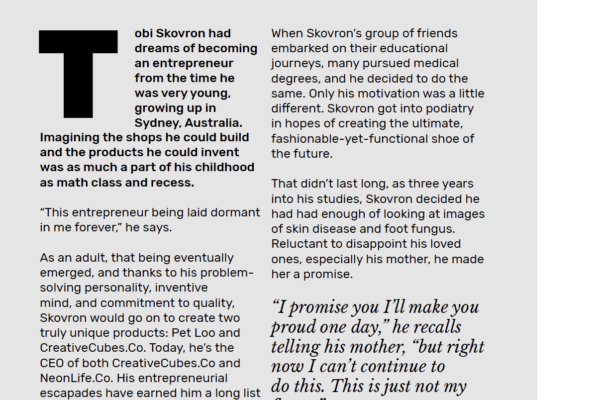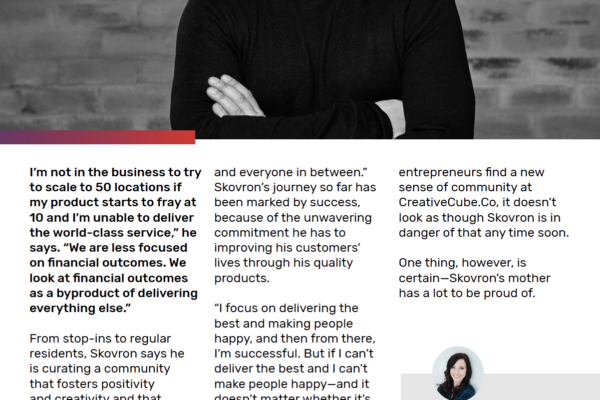Click on the images to enlarge & scroll to read the article OR See full transcript below
Transcript
This article was published in Foundr Magazine-Issue 69
Tobi Skovron had dreams of becoming an entrepreneur from the time he was very young, growing up in Sydney, Australia. Imagining the shops he could build and the products he could invent was as much a part of his childhood as math class and recess. “This entrepreneur being laid dormant in me forever,” he says. As an adult, that being eventually emerged, and thanks to his problem solving personality, inventive mind, and commitment to quality, Skovron would go on to create two truly unique products: Pet Loo and CreativeCubes.Co. Today, he’s the CEO of both CreativeCubes.Co and NeonLife.Co.
His entrepreneurial escapades have earned him a long list of awards, including Winner of Best Overall Mobile Application in a 2015 U.S.-based ranking, Winner of 2018’s Melbourne Design Awards, and Winner of Australian Entrepreneur of the Year Under the Age of 30 back in 2008. But getting to the point of earning awards and helming multiple companies was quite a circuitous route.
When Skovron’s group of friends embarked on their educational journeys, many pursued medical degrees, and he decided to do the same. Only his motivation was a little different. Skovron got into podiatry in hopes of creating the ultimate, fashionable-yet-functional shoe of the future. That didn’t last long, as three years into his studies, Skovron decided he had had enough of looking at images of skin disease and foot fungus. Reluctant to disappoint his loved ones, especially his mother, he made her a promise.
“I promise you I’ll make you proud one day,” he recalls telling his mother, “but right now I can’t continue to do this. This is just not my flavor.”
So he dropped out of college in pursuit of a new goal, only he had no idea what that goal would be. “I’m a university drop out,” he says, recalling his mindset at the time. “My mom believes I can do bigger and better things, but I haven’t found that thing yet.”
He considered becoming a franchise owner of an Athlete’s Foot, a store he had worked at during college, but his mom encouraged him to do more. Skovron felt lost and unsure what his future held, but that was when a new guiding light burst into his life.
Enter Simone, now Skovron’s wife and mother to their two children. She brought him a new sense of meaning and purpose, and he eventually moved with her from Sydney to Melbourne, where they shared a one-bedroom apartment. Here, he decided that the time had come to take one of the most classic “girlfriend, I’m really serious about you,” steps in the book. And it changed his life forever.
In 2003, when Skovron was 23 years old, he bought Simone a dog.
As any dog owner knows, especially those living in apartment buildings, puppy bathroom breaks can be frequent and bothersome. It’s a small price to pay for the love of our furry best friends, but if only there were a more convenient way for them to do their business… This problem struck Simone one day, when she casually wished aloud that there was a patch of grass on the back balcony for their pup. Just like that, a lightbulb went off in Skovron’s head, and the sleeping entrepreneur inside him jolted to life. “That was the eureka moment,” he says. “This entrepreneurial instinct just took over.” Skovron started to toy with the idea of an indoor puppy bathroom that used synthetic grass and could be cleaned for reuse. “I was not really looking to sell it,” Skovron says of his initial idea. “I was just looking to solve my own problem.” But when he solved his own problem, he cracked an unsolved problem for so many others. Friends would come over, see his prototype in action and encourage him to sell it. So began his 10- year journey of designing, manufacturing and selling Pet Loo, a portable, indoor dog toilet that used a combination of synthetic grass, a drainage system and a waste catcher to eliminate those drowsy 5 a.m. dog walks.
Because ecommerce was still a relatively new arena in the early 2000s, Skovron decided to pursue a more traditional mode of selling his product. He loaded a Pet Loo on a trolley and carted it from pet store to pet store across Melbourne, pitching his invention. With every store he visited, his pitch became more and more refined. Slowly but surely he won over smaller, independently owned shops, then worked his way into rising chains like PETstock, Petbarn and Petco. With every new store, he gained hundreds of new customers and solidified his reputation for delivering quality products.
In fact, he says he was so confident in the quality and usefulness of his creation that he sold it exclusively on its value, never on its price. The Pet Loo cost $200, but Skovron knew from experience that people were spending five to 10 times that for disposable pee pads, a solution that wasn’t nearly as convenient or environmentally responsible. He knew that desperate dog owners like him would agree that the value well exceeded the cost.
“If you’re going to make a difference, and it’s going to solve a real pain point for me, I’ll throw everything I’ve got at it,” he says.
He also added a line of matching products, including training supplies, cleaning products and ways to trap and eliminate odors, building lasting loyalty among his customers. “I was able to create a new category in the market and continue to execute it,” he says. But what really put him on the map was an appearance on the Australian television show, The New Inventors. In 2006, Skovron applied to present his invention on the show, and in July of that year, he took his dog on a walk to check his P.O. box for a response. He had received a reply, but it was only to thank him for his application and inform him that they were flooded with submissions and any response would take a few months.
Frustrated with the form letter response, Skovron fumed. “I’m literally scrunching this piece of paper up, going, ‘How many other thousands of people got this?’ and my phone rang,” he says. As if by magic, a voice on the other end of the line asked him if he could catch a flight to Sydney that Friday to be on the show. Two days later, he appeared on the 99th episode of The New Inventors, winning the People’s Choice Award, the first of several awards he would earn, and making the Pet Loo a household name among pet owners.
Just as his business began to boom, Simone Skovron expressed an interest in living abroad. The idea of “throwing themselves to the world” appealed to him as well, and so, after setting up the Australian wing of Pet Loo to operate with him checking in remotely, they hopped on a one-way flight to California. Determined to develop his business in the United States, he gathered up 300,000 Australian dollars to invest in his expansion. The year was 2008, and his timing couldn’t have been worse. At the peak of the global financial crisis, he converted his money and watched as it plummeted to just over $150,000. “I was up shit creek without a paddle, so they say,” he recalls.
“Even though we were a great business [in Australia], doing a few million dollars a year in revenue at a healthy, profitable margin, I basically entered the U.S. market as a startup.” With his product housed in third-party facilities, he operated his business out of the spare bedroom of their Venice Beach apartment, and it felt like starting over again from scratch. “I’ve got to get back to grassroots,” he says. “I’ve got to get back to the hustle. I’ve got to get back to what made the business successful in Australia.”
For years, he labored away in his spare bedroom to make Pet Loo into the kind of phenomenon it had become in Australia, but the toil began to take a toll. “I felt like I was on this treadmill during the day, trying to pound the pavement and crank out more orders and new business,” he says, “and then I’d finish and be completely depleted.”
He recognized that grinding away at work in his home, a place that should be a restful haven, wasn’t a healthy choice for him, so he decided to look into coworking spaces. In the heart of Santa Monica, the third largest technology center in the United States, Skovron took out space in the Real Office Centers building. This changed everything. Suddenly, the secluded, work-from-home entrepreneur was surrounded by some of the biggest and most innovative minds in tech, infusing him with new energy and filling him with life.
“I fell in love with the coworking landscape,” he says. “I sort of fell in love with collaboration, and I fell in love with community. It’s something that was so refreshing to me as an entrepreneur.” Despite being the lone pet-related business owner in the building, he thrived on the newfound ability to meet new people and learn new things, and a new idea began to brew in his mind. So, when PetSafe came knocking in 2013 and asked if Skovron would be interested in selling his company, he said yes. Then he called his business partner and invited him to Santa Monica to see the beauty of the coworking experience and hear his new idea.
he collaborative nature of the coworking community affected Skovron deeply, and that same year, he decided to create one of his own. “While I love the pet landscape, I really, really love community and collaboration, and surrounding myself with likeminded people that want to win,” he says. It took several years for his plan to come to fruition, but in 2016, he and his wife returned to Australia and signed their first building contract. In September 2017, CreativeCubes.Co officially launched.
It’s a coworking space, but one unlike any other. “Our product is received by the consumer the minute they walk into the door,” he says. “The way you’re greeted; the way you’re spoken to; the hospitality we have; the lengths that we will go for you; the space you can reside in; the environments that foster creativity and thought.”
“Nothing you could ask is ever a bother to us, whether it’s big or small.” Skovron describes CreativeCubes.Co as being less like your basic “slap some paint on the wall and put some desks in a room” coworking space, and more like a hotel. Rather than being told where the water is, Skovron says it will be brought to the thirsty visitor. “I want to always deliver the best,” he says. “I want my customers, my members, consumers of my product to know that when they’re interacting with something I’m involved with, that it’s second to none.” And how does he know when he has achieved the best? “It’s my best,” he says. “From me as a creator to you as a consumer, this is the best I have to offer.” He acknowledges that he will always have room to grow, but as long as he gives 100 percent in the moment, he can always make necessary adjustments next week or even later this afternoon. While he believes that CreativeCubes.Co is a scalable business, he says that “this is not about scaling for the sake of scaling and having a watered down product with each building that you open.”
With the second building currently under construction, Skovron says the number of CreativeCubes.Co buildings that pop up will correlate directly to how many he believes he can maintain at his uncompromising level of quality.
I’m not in the business to try to scale to 50 locations if my product starts to fray at 10 and I’m unable to deliver the world-class service,” he says. “We are less focused on financial outcomes. We look at financial outcomes as a byproduct of delivering everything else.” From stop-ins to regular residents, Skovron says he is curating a community that fosters positivity and creativity and that protecting those values is his most important duty. “I built this business based on what I wanted when I was peddling my Pet Loo business. I wanted this type of environment which would take me to the next level,” he says. “I wanted to be around the venture capitalists and the startups and everyone in between.”Skovron’s journey so far has been marked by success, because of the unwavering commitment he has to improving his customers’ lives through his quality products.“I focus on delivering the best and making people happy, and then from there, I’m successful. But if I can’t deliver the best and I can’t make people happy—and it doesn’t matter whether it’s coworking or it’s creating my own sneakers or a dog toilet—if I can’t execute on the one fundamental, which is delivering a good, quality product to a customer, then I don’t deserve to be in business.”
As the Pet Loo continues to fly off the shelves and entrepreneurs find a new sense of community at CreativeCube.Co, it doesn’t look as though Skovron is in danger of that any time soon. One thing, however, is certain—Skovron’s mother has a lot to be proud of.
